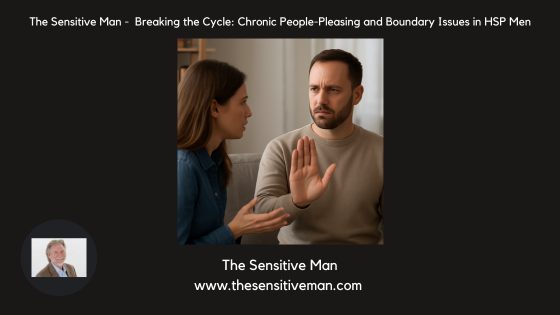The Sensitive Man - Breaking the Cycle: Chronic People-Pleasing and Boundary Issues in HSP Men (By WIlliam Allen)
Oct 08, 2025
- By WIlliam Allen
There is a quiet fatigue many sensitive men carry. It's not always visible, but it shows up in the tight jaw after saying yes when we meant no, in the chronic tension that creeps into our shoulders, or the emotional crash that follows another overcommitment. Many Highly Sensitive Men (HSPs) are deeply attuned to the emotions and needs of others. This is a gift, but without strong internal boundaries, it can lead us into chronic people-pleasing and eventual emotional depletion.
This article explores why people-pleasing is so common among HSP men, how to recognize the signs of boundary burnout, and offers tools for reclaiming your time, energy, and sense of self—without guilt or collapse.

The Tendency to Merge: Why HSPs Struggle with Boundaries
Highly Sensitive People process sensory and emotional input more deeply due to differences in brain function, particularly within areas responsible for empathy and awareness, such as the insula and mirror neuron systems (Acevedo et al., 2014). This means HSP men often notice subtle emotional shifts in others. We sense when someone is disappointed, angry, or in need—even if it hasn't been spoken aloud.
From a young age, many of us were praised for being kind, gentle, or helpful. We may have found safety or identity in being the one others could rely on, the peacemaker or good son. Over time, this conditioning hardwired us to respond reflexively to others' discomfort, often at the cost of our own needs or clarity.
Psychotherapist Dr. Elaine Aron, who pioneered research on high sensitivity, notes that HSPs often feel "a strong desire to avoid conflict" and may "go to great lengths to prevent disharmony," sometimes by merging with others' expectations (Aron, 1996). This merging can feel like compassion, but when unchecked, it becomes self-abandonment.
Recognizing Boundary Burnout
Chronic people-pleasing doesn't always feel like a problem—until it does. Here are a few red flags that suggest your boundaries may be wearing thin:
- You feel resentful or irritated after helping others.
- You say yes while knowing you'll regret it.
- You feel anxious or guilty when you try to say no.
- You apologize for things that aren't your responsibility.
- You often feel invisible, overlooked, or drained in your relationships.
One simple practice is to ask yourself after any "yes": Did I just agree from alignment or obligation? The body often knows first. If your chest feels tight, your stomach drops, or you get a sudden headache, it may be your nervous system saying, That was too much.
Over time, unaddressed boundary fatigue can lead to emotional burnout, decision fatigue, and even physical illness (Neff & Germer, 2018). This is especially true for HSPs, who are more vulnerable to overstimulation and exhaustion from emotional labor.
Scripts and Somatic Tools for Boundary Practice
Boundary-setting is not about becoming cold or unavailable; it's about being present with yourself while being connected to others. Here are some practical tools to begin reclaiming your internal space:
Boundary-Setting Scripts
Use gentle but firm language that honors both your sensitivity and your sovereignty:
- "I'd love to help, but I don't have the bandwidth right now."
- "Let me check in with myself and get back to you."
- "I'm not able to commit to that, but I hope it goes well."
Practicing these aloud—even just with yourself—can help retrain your brain and body to tolerate the discomfort that may arise when you say no.
Somatic Awareness Tools
The body is your ally in discerning what is truly yours to hold. Try these:
- Body scan before responding: Take a deep breath and notice where you feel constricted or open. Does the request feel like a weight or a natural yes?
- Grounding posture: Before or after a difficult conversation, place both feet on the floor, breathe into your belly, and rest your hands on your thighs. This signals safety to your nervous system.
- Sensory reset breaks: Step outside for two minutes. Let your eyes soften and orient to nature. Touch something cool or textured. These subtle resets can prevent overload.
Research in somatic psychology suggests that embodied awareness can interrupt habitual patterns of people-pleasing and bring us back to center (Levine, 2010).
Saying No Without Guilt or Collapse
One of the biggest hurdles HSP men face in boundary work is the emotional aftermath. Saying no can trigger feelings of guilt, fear of rejection, or even a sense of collapse. But that emotional wave doesn't mean you were wrong—it means you're detoxing from an old pattern.
Here are a few reframes to support your inner narrative:
- "I can say no with kindness and still be a good person."
- "Saying no creates space for what's truly mine to do."
- "Each boundary I set builds trust in myself."
Over time, setting boundaries becomes less about defense and more about authenticity. You begin to feel the ground under your feet. You show up not to please, but to relate, grounded in who you are.

You Are Not What You Do
Many sensitive men have been conditioned to earn love and belonging by being helpful, agreeable, or emotionally available. But this is performance, not presence. True self-worth cannot be built on over-functioning or caretaking.
You are valuable not because of what you do for others, but because of who you are. The stillness, depth, and kindness you carry are enough.
Practices that build worth from the inside out include:
- Journaling your wins and boundaries held
- Sitting in silence each day without needing to produce anything
- Affirming your enough-ness without qualifiers: "I am worthy just as I am."
Psychologist Kristin Neff's research on self-compassion reveals that individuals who treat themselves with kindness—rather than self-criticism—experience greater resilience, clearer boundaries, and stronger emotional well-being (Neff, 2011).
Closing: The Courage to Reclaim Yourself
You don't have to fix everyone. You don't have to be available all the time. You don't have to earn your place by disappearing into others' needs. This is the quiet revolution of the sensitive man—learning to honor his empathy without self-erasure.
One boundary. One breath. One "no" that protects your "yes."
Start there.
References
- Acevedo, B. P., Aron, E. N., Aron, A., Sangster, M. D., Collins, N., & Brown, L. L. (2014). The highly sensitive brain: An fMRI study of sensory processing sensitivity and response to others' emotions. Brain and Behavior, 4(4), 580–594.
- Aron, E. N. (1996). The Highly Sensitive Person: How to Thrive When the World Overwhelms You. Broadway Books.
- Levine, P. A. (2010). In an Unspoken Voice: How the Body Releases Trauma and Restores Goodness. North Atlantic Books.
- Neff, K. D., & Germer, C. K. (2018). The Mindful Self-Compassion Workbook. Guilford Press.
- Neff, K. D. (2011). Self-Compassion: The Proven Power of Being Kind to Yourself. William Morrow.
Author

Bill Allen currently lives in Bend, Oregon. He is a certified hypnotist and brain training coach, author and advocate for HSP Men. He believes that male sensitivity is not so rare, but it can be confounding for most males living in a culture of masculine insensitivity, which teaches boys and men to disconnect from their feelings and emotions. His intent is to use this blog to chronicle his personal journey and share with others.
